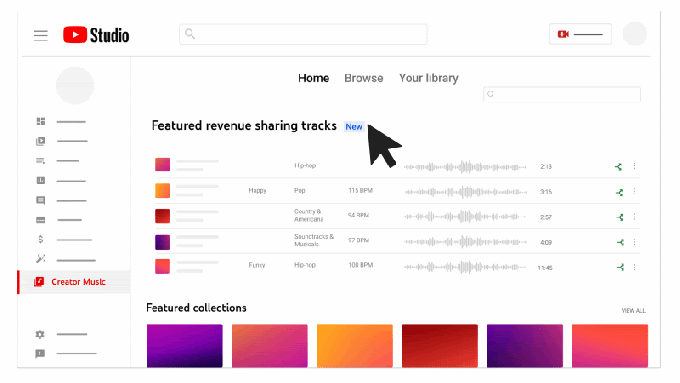YouTube today announced its new marketplace, Creator Music, is now fully open to all YouTube Partner Program participants in the U.S. First announced last September, the online destination offers a large catalog of songs that creators can browse, search through, and purchase where the terms of the music rights are spelled out in plain language, so creators can understand the costs involved. In addition to being able to purchase licenses, creators are also able to choose tracks offering revenue-sharing options where both creators and the rights holders earn money from the music’s use.
As the company explained last year, the issues around music rights have been a longtime pain point for creators.
When a creator today uses a song they don’t own, they end up having to give away all the ad revenues on their video to the music license holder. That means commercial music is often not used in YouTube videos, which hurts creators, their fans, as well as artists and songwriters.
With the launch of Creator Music, the idea is to simplify the process of licensing popular music. Through an online dashboard, creators can search for songs they have in mind or browse by collections, genres, or moods, then view the associated licensing costs. In addition, creators can search for tracks based on a budget they have set for their project.

Image Credits: YouTube
When they find an eligible track, creators can choose to either buy a license after reviewing the terms or opt into a rev share agreement. With the former, creators can check out and immediately download the song to add to their video while editing. If they don’t want to pay an upfront cost for the music’s use, they can choose a track with the rev share option instead.
This type of marketplace could benefit larger creators who more precisely want to control the costs associated with their productions as well as smaller creators who haven’t historically been able to afford commercial music in their videos.
The new service doesn’t replace YouTube’s existing Audio Library of free tracks, however, it just provides another option. To continue to view free songs, including those from the Audio Library, creators can set the price filter to “$0” when searching across Creator Music.
As YouTube now increasingly competes with TikTok on short-form video, the need for better backing tracks for creators’ long-form video content has grown. TikTok’s embrace of popular music has led to the video app having a heavy influence over the Billboard charts and the top charts in streaming apps, as viral videos prompt more streams and music downloads. More recently, TikTok has been rumored to be expanding its own streaming music service, as well — another market where YouTube operates. And as TikTok lengthens the max time for its videos, inching into YouTube territory, the Google-owned video site needed to remain competitive.
Of course, YouTube already offers popular music for use on Shorts through its Shorts Music Library, but many of those same songs wouldn’t have been viable for use on YouTube itself until now because of their associated costs and rights.
At launch, YouTube said it was working with indie partners including Empire, Believe, Downtown, and Merlin. It hasn’t announced any partnerships with the majors at this time.
The Creator Music project was introduced last fall alongside other larger YouTube initiatives, including its plan to monetize Shorts and revamp its Partner Program to include a new Shrots-specific threshold of 1,000 subscribers and 10 million Shorts views over 90 days.
While Creator Music was gradually launched to YPP creators in the U.S., the company says it’s now fully available to that group. YouTube says it aims to bring the service to more countries over time and expand the music options for non-YPP creators, as well.
YouTube launches its new commercial music licensing resource, Creator Music by Sarah Perez originally published on TechCrunch
from TechCrunch https://ift.tt/DFmK2HQ
via IFTTT
Comments
Post a Comment